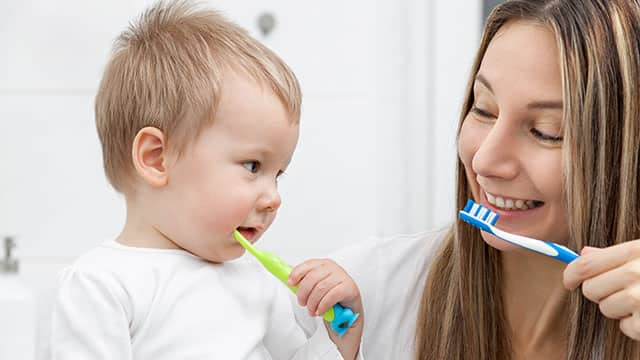A Parents' Guide to Childhood Oral Hygiene Practices
Caring for your child’s oral health begins on day one. Even before baby’s first tooth arrives, tending to your infant’s oral hygiene is essential. And even though baby teeth end up with the tooth fairy, those cute mini-chompers play an important role throughout life. They're vital to the health of your little one's gums (which last a lifetime) and to the permanent teeth preparing to come in underneath.
Without proper care, plaque can build up on the baby teeth and lead to tooth decay and cavities. In the early stages, tooth decay may look like white spots on the teeth, but if it progresses, cavities (holes) will form in the teeth. These may look brown or black. Left unchecked, cavities can lead to pain, infection, and even tooth loss. Because the baby teeth act as placeholders for the permanent teeth, this can also cause problems when those adult teeth eventually come through. For example, there may not be enough space for them, and the teeth might be crowded and in need of orthodontic treatment as a result.
Plaque can also lead to gum disease, an infection of the gums that causes swelling, inflammation and bleeding when brushing the teeth. Like tooth decay, gum disease can lead to pain, infection and tooth loss if not treated. In both cases, catching the condition early means that your dentist may be able to reverse the damage and prevent long-term problems.
Keep in Mind
- Without proper care, your petite sweetie's baby teeth can decay. In the early stages, cavities appear on the teeth as white spots, turning black or brown as the cavities get large. Bad breath can also be a sign that your youngster has a cavity.
- If plaque builds up inside your child's mouth, gum disease could develop – with red, swollen, and bleeding gums as symptoms.
- During the years your baby grows into a fully functional child, make sure each step of the way you have age-appropriate:
- Toothbrushes with extra soft or soft bristles to fit their mouths – and start a new toothbrush every three months.
- Toothpaste with taste-bud appeal and tolerance for certain ingredients – such as artificial colors, preservatives, harsh flavors, and sodium lauryl sulfate.
Oral Care Timeline
Newborn to 6 Months: "Brush" away the bacteria from your baby's gums at least once daily:
- Wrap clean, soft, moist gauze around your finger or put on a terry-cloth finger cot.
- Gently rub the gauze or cot along your baby's gums.
6 Months through Age 1: When your little darling's teeth start coming in, get out the baby toothbrush and toothpaste. Start gentle, twice-daily cleanings and set up the first dental visit:
- Put a grain-of-rice-sized sliver of fluoridated baby toothpaste on the brush. (Your baby won't be able to spit.)
- Start using a finger toothbrush that doubles as a teething toy.
- Schedule baby's first dentist appointment before your infant turns 1 year old.
- Only give your kid water in nighttime bottles and in sippy cups to avoid Baby Bottle Tooth Decay. (Continue this practice as your child gets older.)
Ages 2 to 3: At these ages, your kid likes being more independent. They might want to hold their own toothbrush but lack the manual dexterity to brush effectively. That's why you must continue to be hands-on with their oral care during these important years:
- At age 2, continue with toothpaste the size of a grain of rice.
- At 3, put a pea-sized dab on their toothbrush and teach them the art of spitting.
- Make brush time fun time by singing silly brushing songs and playing goofy brushing games.
- Find and read some great children's books about oral care habits and dentist visits.
- If your child insists on holding their own brush, put your hand over their hand to ensure teeth are properly brushed.
- Spark your little one's curiosity by brushing your teeth in front of your child.
- When two of your tot's teeth start touching, clean gently between them with waxed floss, floss picks, or interdental cleaners.
- Schedule morning dentist visits when kids at these ages are usually on their best behavior.
- Put on a happy face during dental visits to eliminate anxiety.
Ages 4 to 5: Keep up the great routines you've established with brushing, flossing, and visiting the dentist. And add these activities:
- Teach your kid how to brush and let them practice at least once a day.
- But, since your tyke still lacks the manual dexterity to brush thoroughly, you'll need to brush their teeth again, especially at bedtime.
- Devote new ways to making the brushing experience fun.
- Add new age-appropriate dental-related books to reading time.
Ages 6 to 8: By this time, your kid can do many oral health care tasks independently. Your job will mainly be an oral health care monitor – though give yourself a more fun title! (Inspector Fangs, perhaps?)
- Check the effectiveness of your child's toothbrushing with dental disclosing tablets. By staining plaque areas on your kid's teeth, these tablets provide an entertaining way to see what areas need further brushing.
- Introduce rinsing with fluoridated, bacteria-destroying mild mouthwash, or rinse. Kids love to spit at this age!
- Help your youngster floss their own teeth until they develop the knack.
By age 9, your kid should be an oral care expert – and you can give yourself a well-deserved pat on the back.
Raising children is a lot of work but with major rewards. If you start your child's life on the right oral health path, it should be much easier to continue the journey every step of the way. And the reward will be your kid's beautiful, healthy smile!
Oral Care Center articles are reviewed by an oral health medical professional. This information is for educational purposes only. This content is not intended to be a substitute for professional medical advice, diagnosis or treatment. Always seek the advice of your dentist, physician or other qualified healthcare provider.
ORAL HEALTH QUIZ
What's behind your smile?
Take our Oral Health assessment to get the most from your oral care routine
ORAL HEALTH QUIZ
What's behind your smile?
Take our Oral Health assessment to get the most from your oral care routine
Join Us
Get the best of your oral health routine and take it to the next level with expert advice, recommendations, products and solutions and special offers.
Join Us
Get the best of your oral health routine and take it to the next level with expert advice, recommendations, products and solutions and special offers.















